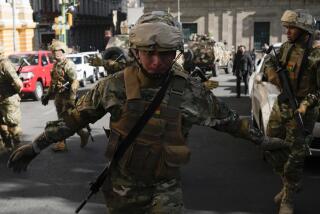Aborted Zambia Coup Rattles Region
- Share via
NAIROBI, Kenya — Rebels tried unsuccessfully to overthrow Zambian President Frederick Chiluba on Tuesday, raising fears of political instability in a country considered a bulwark of peace in Southern Africa.
The putsch was thwarted about five hours after it was announced on state radio by the leader of a previously unknown military group calling itself the National Redemption Council. However, observers said the incident has damaged efforts by Southern African leaders to portray their region as devoid of the ethnic and political turmoil that recently has racked other areas of the continent.
“There will be [a] negative impact,” Milton Phiri, Zambia’s high commissioner to neighboring Botswana, told the South African Press Assn. “It will cast a shadow of doubt on the future political stability of our region.”
The coup’s apparent leader, who called himself “Captain Solo” but was later identified as Capt. Stephen Lungu, told state radio listeners at dawn Tuesday that Chiluba and his Movement for Multiparty Democracy government had been ousted because of corruption and criminal activity. He added that all senior military and police officers had been fired.
Lungu said Chiluba would be shot on sight if he refused to surrender.
When troops loyal to the government stormed the radio station at Zambian National Broadcasting Corp. headquarters, which had been seized by the coup plotters, a dissident army officer reportedly was killed and 15 others arrested, including Lungu. Local reporters said government troops were hunting for more suspects.
Once calm had been restored in Lusaka, the capital, Chiluba declared on state radio that “the enemy is defeated” and that he was still firmly in charge.
Officials in Lusaka were unable to give details Tuesday of the extent of the coup or the motive of the plotters. Defense Minister Ben Mwila called the rebellion “the work of a few undisciplined soldiers,” according to Associated Press.
But Phiri, the envoy to Botswana, blamed the coup on former President Kenneth D. Kaunda, who left office in 1991 and recently has been attempting a political comeback. “I’m sure he’s behind it; the man is very crafty,” Phiri said.
Officials at the headquarters of Kaunda’s United National Independence Party, or UNIP, denied that the former president was involved in the abortive takeover.
Rabbison Chongo, UNIP’s chairman for economy and finance, said the attempted coup did not come as a surprise. “We have been worried about the tension in the country, the general atmosphere of acrimony and bitterness,” he said.
Landlocked Zambia--formerly the British colony of Northern Rhodesia--won praise for its bloodless transition of political power in 1991, when Chiluba defeated Kaunda in the nation’s first multi-party election. Chiluba won reelection in 1996.
Although Chiluba’s government has earned international praise for its privatization program, most of Zambia’s roughly 9.5 million people have been struggling economically after the sweeping layoffs that followed the liquidation and privatization of about 75% of government-owned ventures. In addition, some government officials have been accused of corruption and involvement with organized crime.
More to Read
Sign up for Essential California
The most important California stories and recommendations in your inbox every morning.
You may occasionally receive promotional content from the Los Angeles Times.














